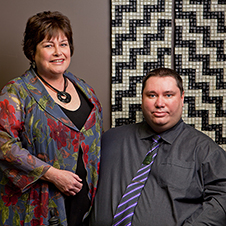A new University of Otago, Wellington article has shone a light on the risks and difficulties faced by tāngata whaikaha, the disabled Māori community, during COVID-19.
The commentary, published in the American Indian Culture and Research Journal, discusses the inequities faced by tāngata whaikaha after Aotearoa went into lockdown last year.
The paper highlights specific mechanisms that have been developed that the authors say have the potential to exacerbate inequities, such as data-centred algorithms and inequitable resource distribution frameworks.
 Senior Research Fellow Bernadette Jones and Tristram Ingham.
Senior Research Fellow Bernadette Jones and Tristram Ingham.
“This pandemic, and the subsequent health systems responses, have brought into sharp focus the longstanding inequities for Indigenous populations,” co-author Dr Tristram Ingham (Ngāti Kahungunu, Ngāti Porou) from the Division of Health Science at the University of Otago states.
“The pandemic has seen the emergence of new mechanisms that have the potential to contribute to inequities such as frameworks for resource rationalization that are entrenched with negative views of ethnicity and disability.”
Lead author, Senior Research Fellow in the Department of Medicine at University of Otago Wellington, Bernadette Jones (Ngā Wairiki, Ngāti Apa) says the paper is a reality check for a community grappling with underlying conditions.
“Māori have higher rates of chronic health conditions, and a lot of unmet need. Then you factor in disability and there's this double jeopardy situation we call intersectionality.
“Within this already marginalised group, the people most affected are tāngata whaikaha. This is why you need representative voices at the table to ensure the outcomes are fair for everyone.”
Co-author Dr Paula King (Te Aupōuri, Te Rarawa, Ngāpuhi, Ngāti Whātua, Waikato Tainui, Ngāti Maniapoto) says algorithm-based tools to prioritise resources are being developed in New Zealand, specifically for use when triaging resources in intensive care units.
“They have also been suggested for use within other situations such as COVID-19 vaccination,” she adds. “In colonial, racist societies it is likely that algorithms will produce racialised inequities.”
She says prioritisation tools not underpinned by equity that are used to make decisions about access to ICU ventilators or COVID-19 vaccinations will increase the inequity for groups already experiencing systematic and structural oppression.
The paper is also calling for the government and health agencies responsible for policies and practices to work directly with tāngata whaikaha as early as possible. The recent announcement of a new Māori Health Authority, Jones says, is a great new opportunity to action this.
“We definitely don't want to be involved as an add-on, or just as an advisory.”
“Aotearoa has tāngata whaikaha who have expertise across the professions – doctors and nurses, Māori lawyers, and other health professionals. The expertise is there, and we need to make sure it is used to get this right from the outset.”
The other key action point from the paper is the collection of high quality ethnicity and disability data to ensure equitable information.
“When the call went out during pandemic and lockdown about getting in contact with disabled people, the information for this group wasn't available, which is a real problem. How do you know who to support if you don't know who they are?
“Some whānau are deaf so you can't just call them up. Some are blind so you can't just send a letter, others need support just to get out of bed, so you have an at-risk population here and agencies need to know who they are and how to get in contact with this important community.”
For more information, please contact:
Bernadette Jones
Senior Research Fellow
Department of Medicine
University of Otago, Wellington
Email bernadette.jones@otago.ac.nz
Matiu Workman
Communications Adviser (Māori)
University of Otago
Tel +64 3 479 9139
Mob +64 21 279 9139
Email matiu.workman@otago.ac.nz
Find an Otago Expert
Use our Media Expertise Database to find an Otago researcher for media comment.
